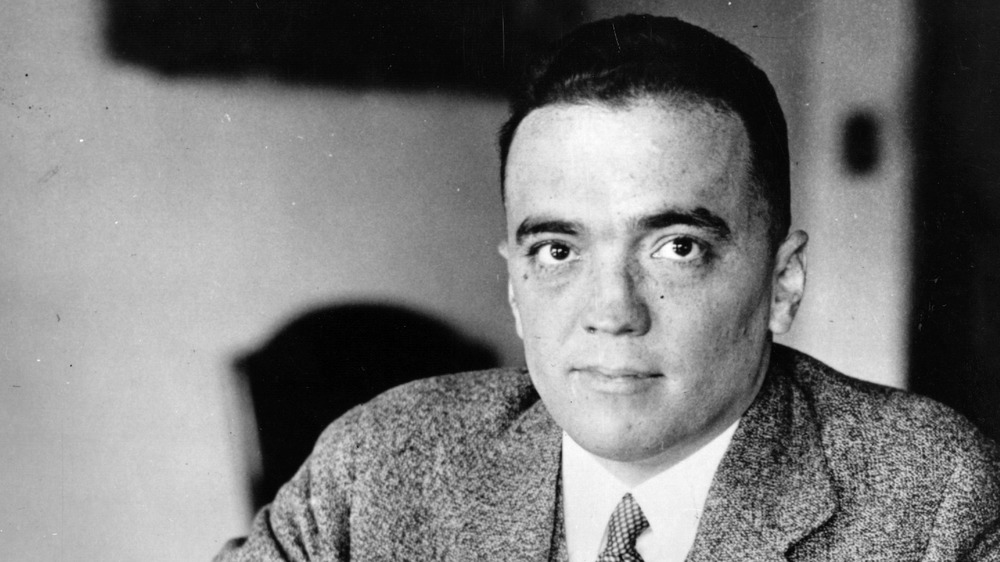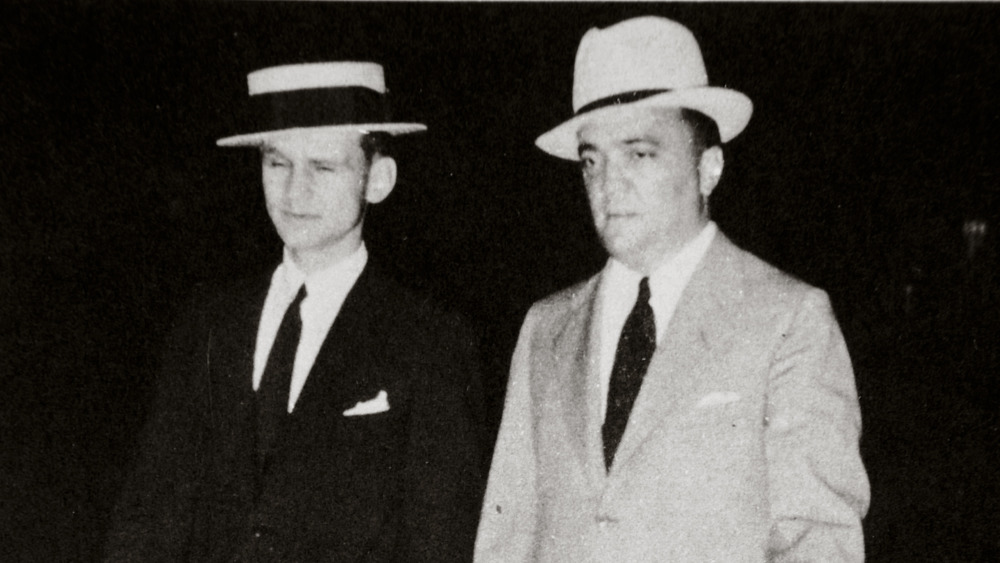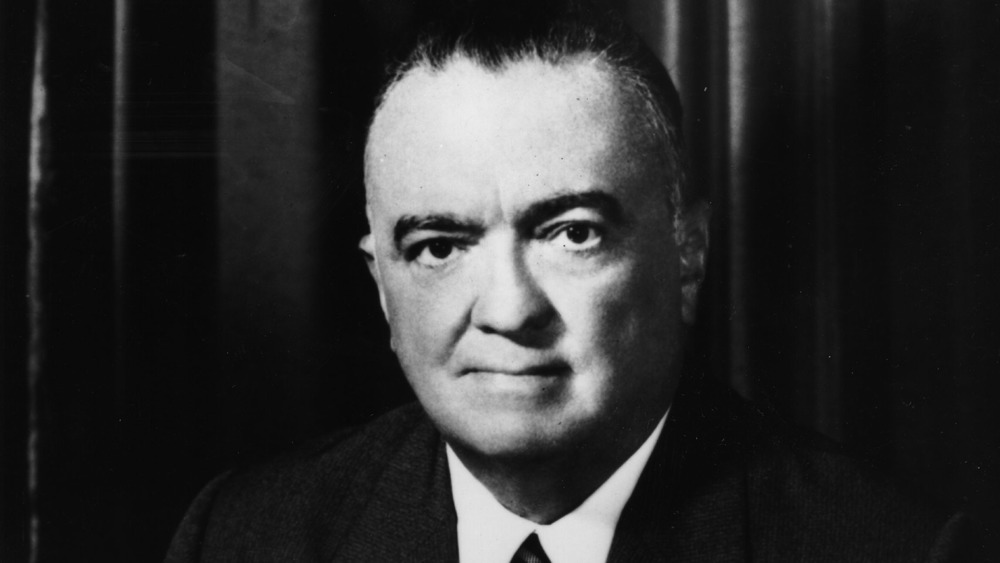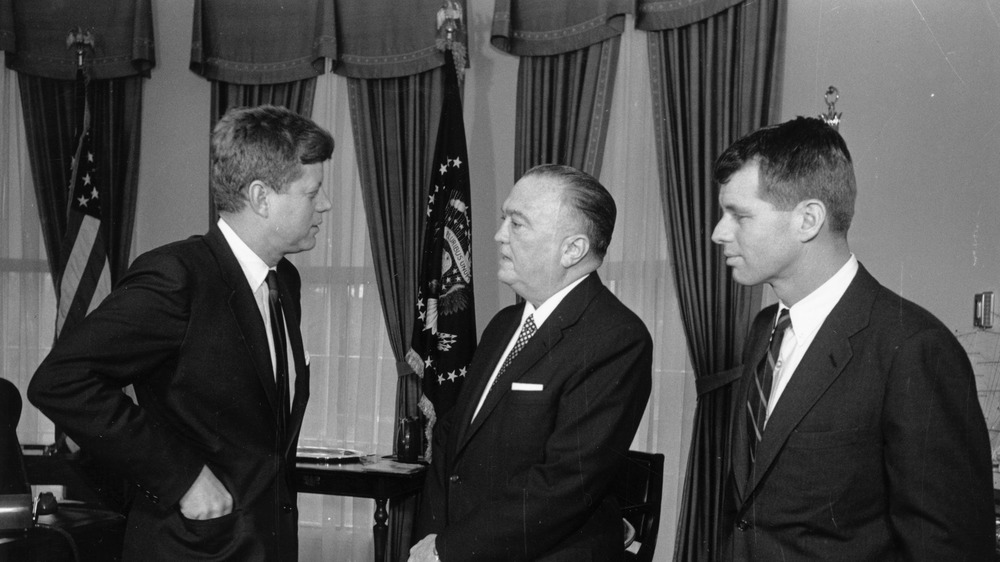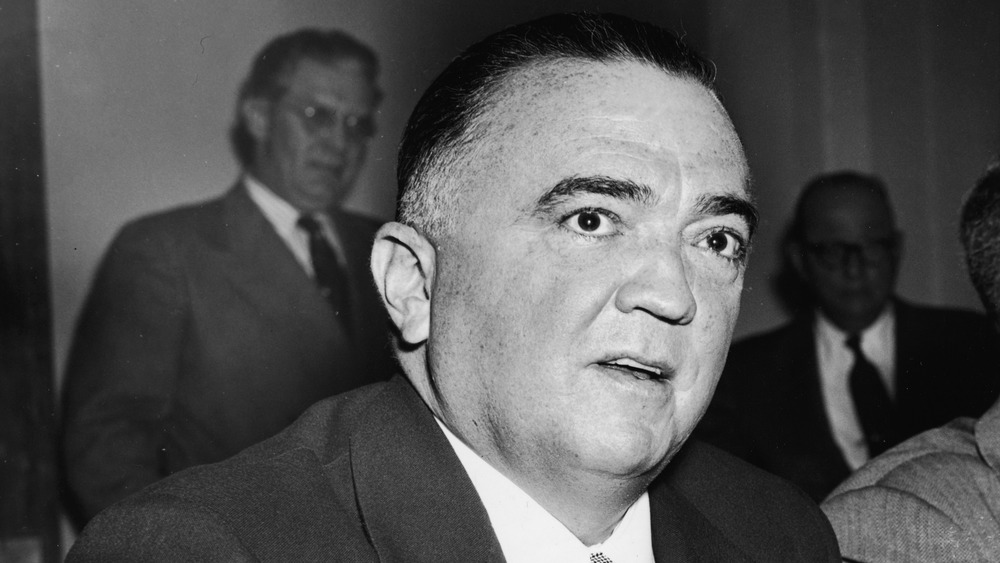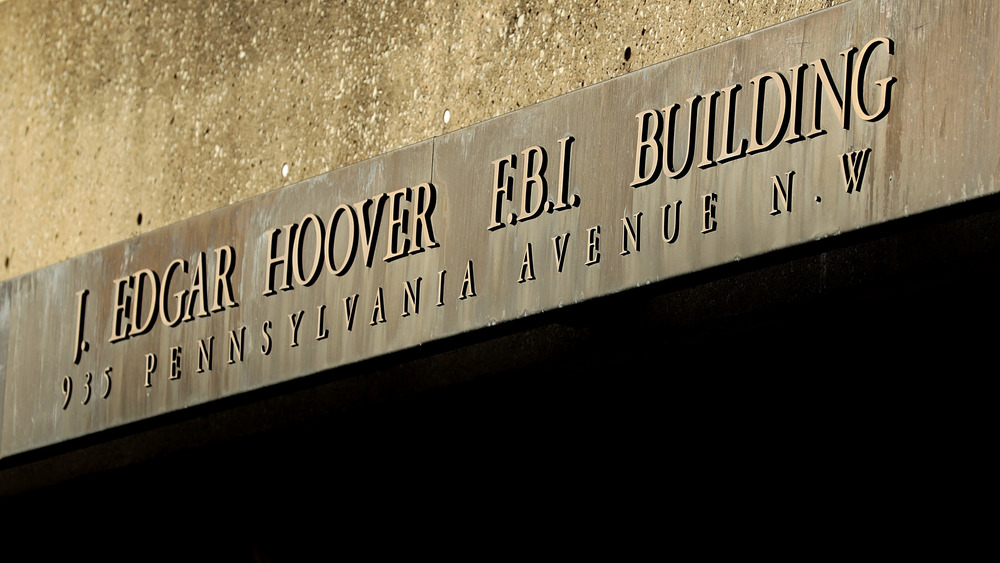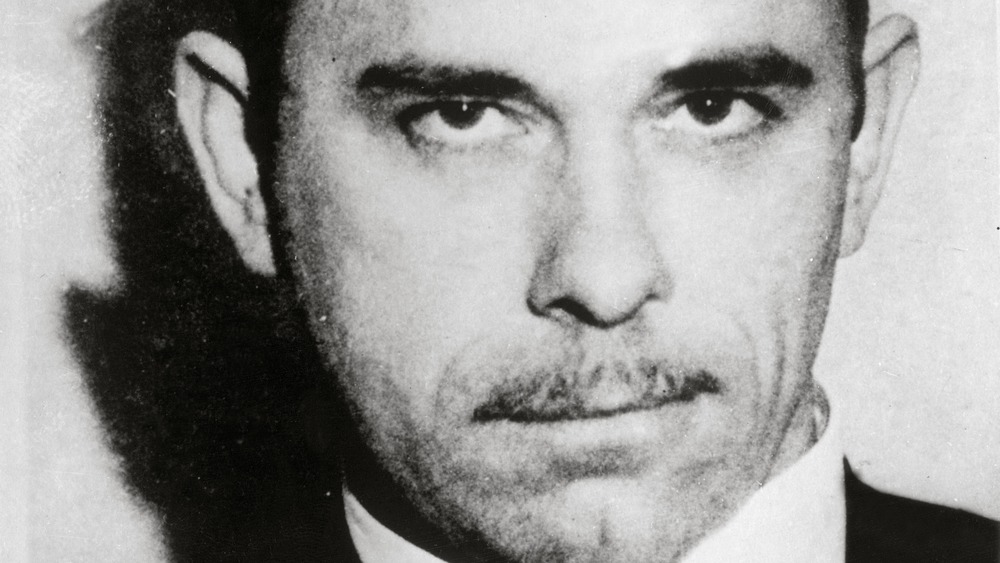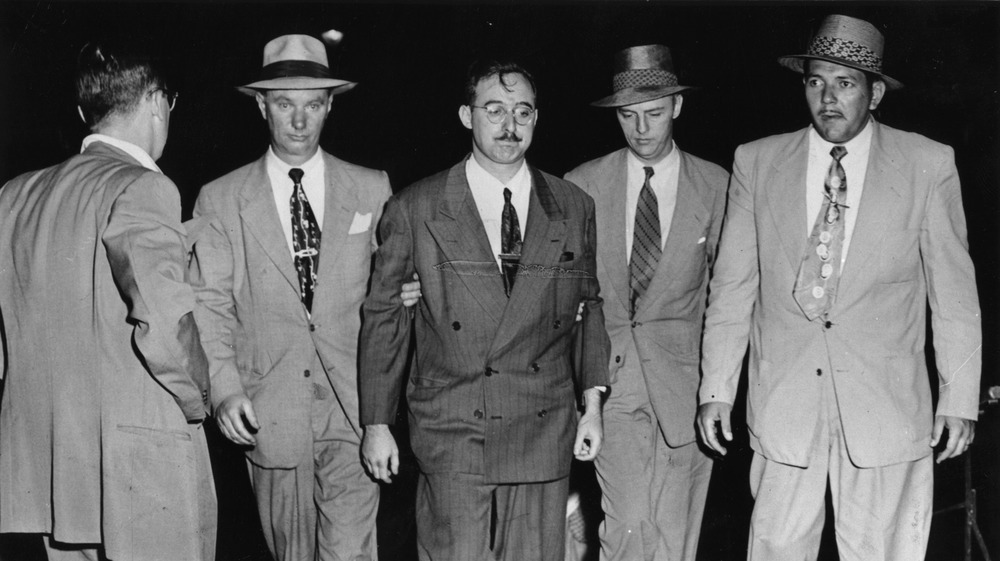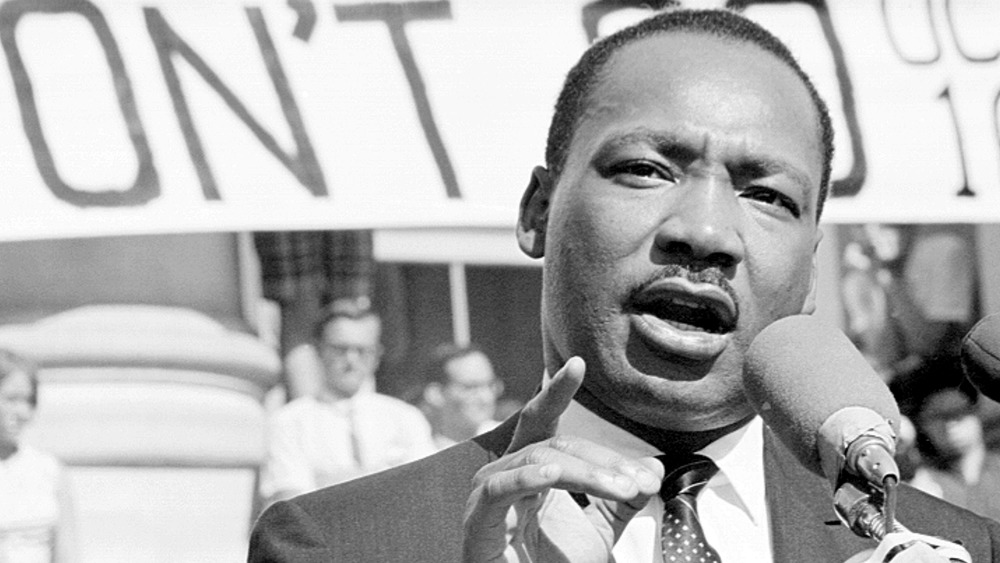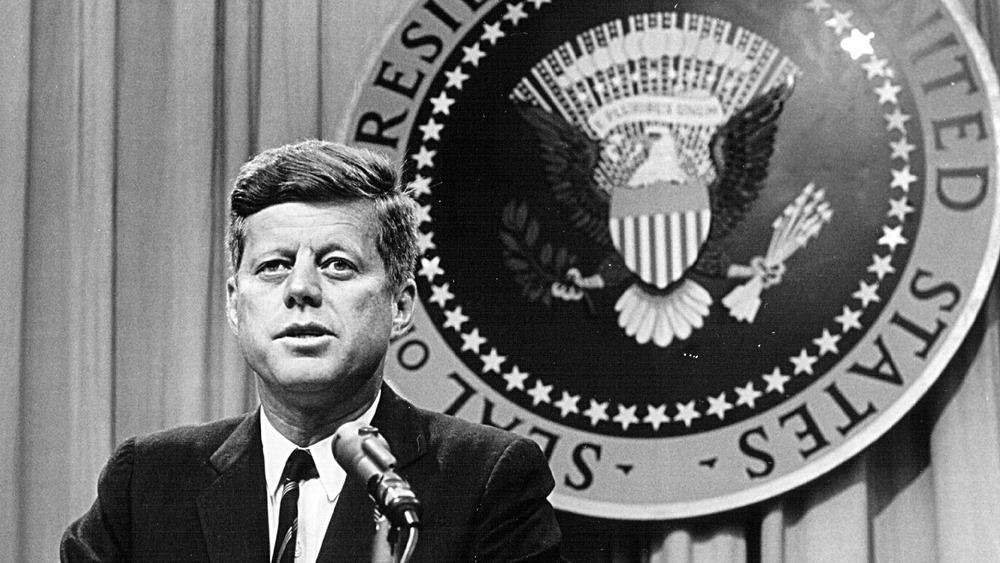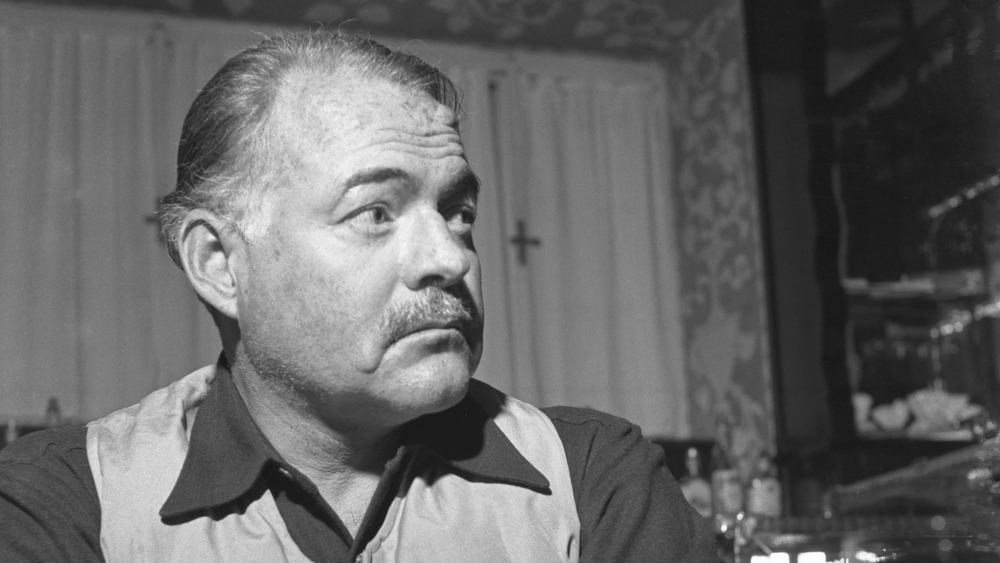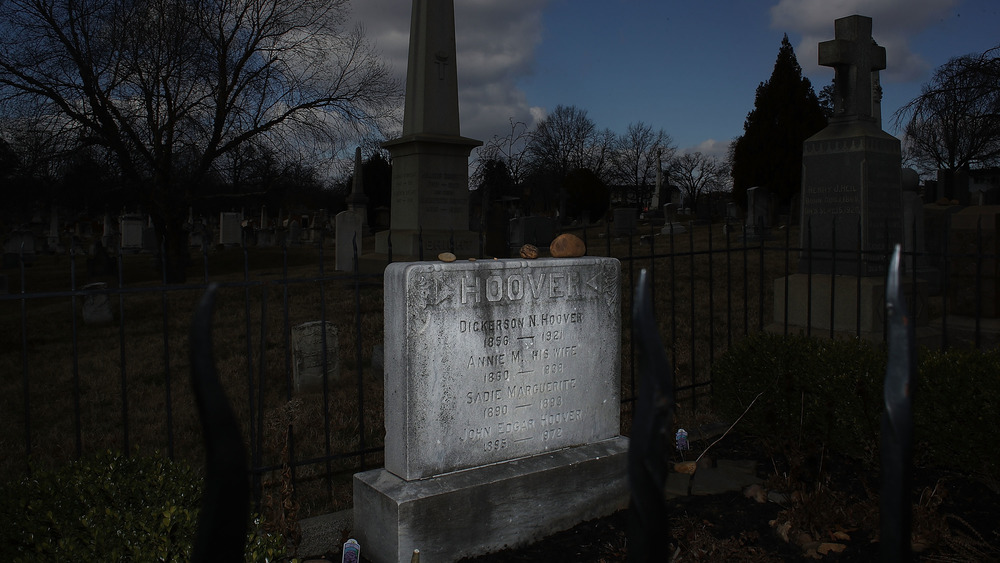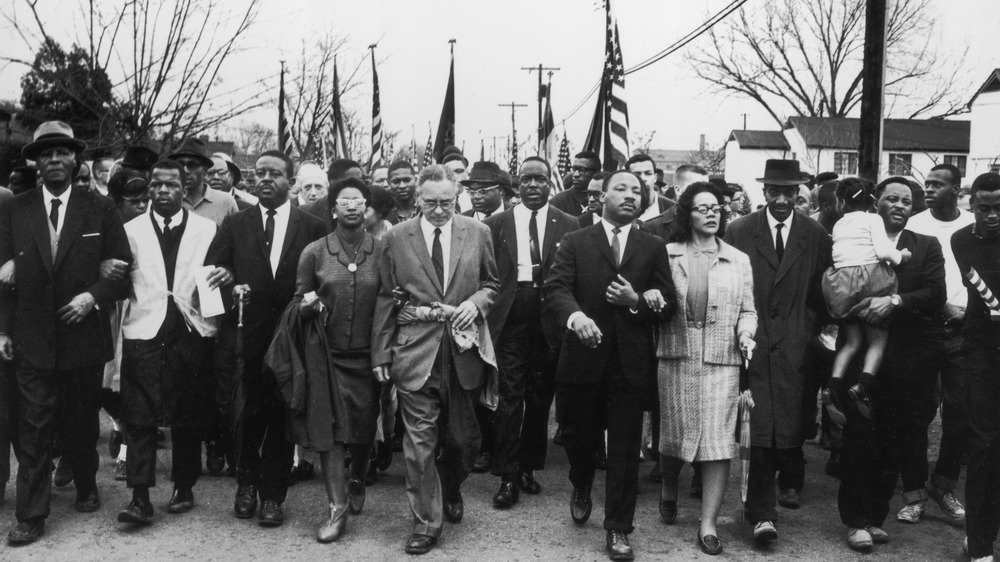False Things Everyone Believes About J. Edgar Hoover
Some people leave an impact on the world so great that it's felt long after they're gone. This is an apt description of Federal Bureau of Investigation (FBI) Director J. Edgar Hoover. He served in his role for nearly 50 years and worked under a number of presidents from both parties from 1924 to 1972. His name is now synonymous with the FBI, and the building that houses the bureau bears that name today.
Even while he was alive, Hoover was considered mysterious. Notoriously reluctant to discuss his personal life, very little was known about the man behind the desk, and things actually got murkier after his death. This has led to untold numbers of rumors about Hoover and how he ran things.
Some of these rumors can be attributed to typical gossiping, but at least a few were spread by Hoover's enemies, and with five decades in a top law enforcement position, you're bound to make a lot of enemies.
J. Edgar Hoover was secretly gay
J. Edgar Hoover was a confirmed bachelor — that is, unmarried and not looking. Many who knew him wondered if there was a significant other in his life, and the answer seemed to be a definitive no. In fact, Hoover barely spent time with anyone outside of work except his deputy director and friend Clyde Tolson. The pair were inseparable, according to ABC News.
Naturally, this spawned a number of rumors of Hoover being a gay man, something very much against the norms of his day. This would be especially ironic considering Hoover's FBI spent a lot of time investigating rumors of powerful people being secretly homosexual. It is certainly possible that he was gay and having a relationship with Tolson. He and Tolson went everywhere together, and Hoover even left him everything in his will. It's far from confirmed, however, and Hoover's relationships would seem to be complicated.
For Hoover's part, he was essentially married to his job and didn't have time for relationships. He never openly identified as gay (for understandable reasons, considering the times), and there's a decent argument to be had that he was actually asexual and just not interested in romance at all. The fact is, not enough is known to say for sure one way or another.
J. Edgar Hoover secretly dressed in women's clothes
Most any depiction of J. Edgar Hoover from the last several decades hints at or outright states that he enjoyed dressing in women's clothes. You can see this in places like the animated comedy, The Critic, to Clint Eastwood's 2011 movie, J. Edgar. It comes up in pop culture so much, it must be a confirmed fact, right?
No, and in fact, all of this seems to stem from a single dubious claim made in the early 1990s by a socialite named Susan Rosenstiel. According to Rosenstiel, she witnessed Hoover attending an all-male party in full drag. However, it's worth noting that Rosenstiel was not an unbiased source. Her ex-husband was an FBI agent and friend of Hoover's, and Rosenstiel apparently held a grudge against him. Most historians dismiss her claim, according to the The Washington Post.
Sadly, it seems a big reason this rumor got traction was because of the rumors of Hoover's sexuality, and in American society at the time, homosexuality and transvestitism were treated as one and the same, though in reality there's not necessarily any connection between the two. The implication, of course, is this is damaging to his moral character in some way — beliefs that have been largely discarded today.
J. Edgar Hoover kept his job by blackmailing multiple presidents
While it's now uncommon for an FBI director to hold the office for more than a few years, J. Edgar Hoover managed to stick around for decades, working with multiple presidents and their administrations. In fact, several of those presidents openly disliked Hoover, and yet he remained in his job. Why? According to various rumors over the years, it's because Hoover had tons of blackmail material on each of the presidents he served under.
Hoover was long suspected of having compromising information about almost anyone in Washington. It stands to reason that this would expand to presidents, who are only human, and thus Hoover wielded enormous control over them. However, the reality is that this scenario is pretty unlikely, according to the The Washington Post.
Hoover battled several of the presidents he worked with, but it seems the real reason Hoover remained FBI director so long isn't nearly as thrilling as blackmail against the commander-in-chief. The truth is, the public supported Hoover by overwhelming numbers, meaning any president who got rid of him would have the ire of voters to look forward to. He was seen as honest and respectable, an image that wouldn't change until after his death.
J. Edgar Hoover was a draft dodger
For most of American history, it was expected for adult men to join the military pretty much as soon as they were able, and anyone who didn't was considered cowardly. For some, they enlisted the day they turned 18 or after high school. For fewer still, it was after completing college. J. Edgar Hoover would have fit into this latter group.
After completing law school in 1917, Hoover was expected by his peers to join the Army, especially since America was just getting into World War I. Hoover, however, immediately took a job with the Justice Department, and what's more, it was draft-exempt, meaning he couldn't be forced to fight, according to the The Washington Post.
Later in life, Hoover was notoriously vocal against so-called draft dodgers — young men who refused to be sent to fight in Vietnam. As such, Hoover's own history was pointed to as an example of his hypocrisy. How could a man demand others to fight when he himself was a coward? In reality, though, his decision probably had a more practical reason. He was the sole breadwinner of his family, with his father being unable to hold a job due to mental illness. There's actually some evidence that Hoover wanted to fight but needed the Justice Department job because it probably paid significantly more than the military would have.
J. Edgar Hoover, often accused of racism, was secretly Black
While J. Edgar Hoover was the FBI's director, a lot of huge changes came about in the United States regarding racial equality. Hoover's FBI did some things that were argued to be racist at the time (and are without a doubt racist by modern standards) such as surveilling civil rights groups, harassing Martin Luther King, Jr. (more on that later) and other Black leaders, and being vocally opposed to equal rights.
Thus arose allegations that Hoover himself was at least partially Black, according to the The Washington Post. There's a lot of messed up stuff about this myth, so let's start unpacking. First of all, no, he wasn't. According to the rumors, Hoover was secretly a mixed-race child adopted by a white family or had relatives that were Black. No evidence has ever come up for the adoption theory, and the Black relatives theory is similarly unproven. Let's not forget that many white Americans of the time had Black ancestors due to less-than-consensual encounters between enslavers and the women they enslaved.
On top of that, this theory smacks of the "one drop" ideology so common in America's early centuries — basically, if you had one ancestor that was Black (or any other minority), you were Black too, even if you never identified as such. This rumor also carries the horrifying implication that being Black would be bad and something of which Hoover was ashamed, much like the rumors of his homosexuality.
J. Edgar Hoover's FBI secretly kept John Dillinger's private parts
One of the big early wins in the FBI under J. Edgar Hoover was his successful campaign to sway the public from treating gangsters as folk heroes and instead consider them criminals. The FBI was able to help put away gangsters such as Al Capone, Machine Gun Kelly (not the musician), and infamous bank robber John Dillinger.
Dillinger was an extremely difficult get for authorities, escaping capture numerous times and even breaking out of jail. Eventually, though, the FBI finally caught up with him in a theater in Chicago in 1934, where he was killed in a shoot-out. This would just be another organized crime member brought down by a lot of hard work, if not for a bizarre rumor relating to Dillinger's death.
According to rumors, Dillinger was exceptionally well-endowed, and because Dillinger caused the FBI so many problems, as a way of getting back at him after his death, Hoover ordered that this large endowment be removed and kept by the federal government. Some insist that it's in a collection at the Smithsonian. While this would indeed be strange if it was true, it is a complete fabrication, according to Snopes. None of Dillinger's body parts were removed after his death (nor did medical reports make mention of anything being unusually sized), and neither the Smithsonian nor any other collections of American artifacts possesses Dillinger's manhood.
J. Edgar Hoover and the great border mishap
One thing that was certainly true about J. Edgar Hoover was his fastidiousness and attention to detail. He had very particular standards for FBI agents to follow, and any caught breaking the rules could expect swift correction. In fact, it's said that Hoover was so strict that agents eventually became afraid of even questioning his orders.
It was under this umbrella of unquestioning autocracy that a myth about a humorous misunderstanding emerged. Hoover supposedly had very specific margins he insisted agents follow on memoranda and other documents. According to the legend, an agent once sent out a memo with incorrect margins. Hoover handwrote a message on the paper, reading, "Watch the borders!" This led the FBI to unquestioningly send hundreds of agents to the U.S. borders with Canada and Mexico, misunderstanding Hoover's note completely.
This tale may actually be partially true, according to Snopes. Hoover was definitely strict about bureau correspondence, and he was well known for writing notes in the margins of documents, to the point that Hoover marginalia has informed historians quite a bit about his life and thoughts. It also seems very possible that this particular note was real. The false part is how agents reacted. There's no evidence that anyone was sent to "watch the borders." At worst, it seems that the note inspired some confused phone calls, if it even happened at all.
J. Edgar Hoover and the FBI had Martin Luther King, Jr. killed
J. Edgar Hoover was no supporter of the civil rights movement. The FBI spent a lot of time and effort on undermining leaders in the movement, especially Martin Luther King, Jr. The bureau investigated King out of a belief that he was connected to communists, according to The Atlantic. How much he truly was involved with communists versus how much the FBI wanted him to be is up to your own interpretation.
What's more, FBI agents wrote threatening letters to King, and on at least one occasion encouraged him to commit suicide. Hoover and his agents also uncovered King's various affairs in hopes of blackmailing him. None of this is a myth, it's all verifiable, and it's what leads people to believe that Hoover's FBI had King assassinated in Memphis, Tenn., on April 4, 1968.
Some versions of this myth say that James Earl Ray, the man convicted of murdering King, was merely a patsy, and an FBI sniper or Memphis police officer actually pulled the trigger. Others claim that Ray did kill King, but he did so under orders from the FBI and/or Hoover specifically, according to the The Washington Post. The likelihood of this is pretty slim, however. While the FBI was undoubtedly horrible to King, and King's own family accused the FBI of being involved in his death because of that, the evidence of any direct FBI involvement just isn't there.
J. Edgar Hoover and the FBI had a hand in JFK's assassination
J. Edgar Hoover was also no friend to President John F. Kennedy during his time in office. Reports frequently suggest that Hoover and Kennedy were at odds about even basic matters, and that's not even getting into the fact that the FBI are the ones who uncovered affairs involving JFK by surveilling his mistresses, according to the The Washington Post.
Much like the King assassination theory, the Kennedy assassination thory takes two forms. One states that Lee Harvey Oswald was just the fall guy, but the long-rumored second gunman was an FBI agent who really killed Kennedy. And of course, the second version says that Oswald was the killer, but he was put up to it by the FBI. (For what it's worth, Oswald was actually an FBI informant.)
Unfortunately, there's just no motive out there that fits the theory, according to University of Georgia law professor Donald E. Wilkes, Jr. Hoover and Kennedy strongly disliked one another, and they definitely had some problems, but none of them really rise to the level of assassination. There are no shortage of theories as to who was really behind the JFK assassination, and frankly this isn't even one of the more interesting ones. The only evidence is two powerful men who didn't get along, which isn't really enough to get most Kennedy truthers out of bed in the morning. There's no motive or strong evidence pointing to this being fact.
J. Edgar Hoover's FBI drove Ernest Hemingway to suicide
American author Ernest Hemingway, later in his life, was beginning to show very serious signs of mental illness and long-term effects of alcohol abuse. One of his most common claims during this time, according to A.E. Hotchner, his friend and biographer, was that he was secretly being watched by the FBI. While people close to Hemingway assumed this was simply paranoia of some kind, it turned out years later that Hemingway was actually correct — the FBI had been watching him very closely in the years before his suicide on July 1, 1961.
The FBI would later release their files on Hemingway, according to The Vintage News. They knew that Hemingway had political affiliations that led them to believe he was a communist sympathizer, and that he had been approached by Soviet agents who tried to recruit him as a spy on behalf of the KGB, according to The Guardian.
After Hemingway's death and the FBI's divulgence that they had indeed been watching him, some accusations came out that the FBI hounded Hemingway so badly that it drove him to suicide. It's hard to prove or disprove that assertion, as it's pretty much just speculation. But it is worth noting that Hemingway's struggles with mental illness and alcoholism were probably far more likely contributors to his suicide.
If you or anyone you know is having suicidal thoughts, please call the National Suicide Prevention Lifeline at 1-800-273-TALK (8255).
J. Edgar Hoover had an enormous stash of secret files
It's a pretty well-known fact that J. Edgar Hoover and the FBI had dirt on a ton of people and not just in Washington, D.C. Hoover wasn't shy about letting various celebrities and politicians know that he had compromising info on them, either.
But, rumors have swirled for decades that Hoover had a vast series of personal files that were kept only in his private office at the FBI. It was widely believed that whatever was in Hoover's personal files would absolutely wreck most any high-powered career out there. These rumors grew out of control after Hoover's death in 1972, when his secretary and friend Helen Gandy began purging Hoover's personal files, according to History Collection.
The only people who actually know what was in those files were Hoover himself and Gandy, and according to Gandy, they were actually just personal files, like tax records, personal letters, or vet records for his dogs. While Gandy destroyed those files, 17,000 were turned over to the FBI. These held actual information, and they've been released in a redacted format as of 2005. These files did have some pretty damaging stuff but nothing worse than what was in the official files. While these are likely to be the secret files Hoover was rumored to have, the release hasn't stopped conspiracy theories that the far worse stuff was destroyed after Hoover's death.
J. Edgar Hoover hounded MLK solely because he was racist
By modern standards, J. Edgar Hoover would be considered a racist. He was openly opposed to the civil rights movement and was clearly on the wrong side of history there. Hoover and the FBI also repeatedly attacked, demeaned, harassed, and monitored various civil rights leaders, and yet he saved his worst offenses for Martin Luther King, Jr. The question is, why? Is it because he sensed that King would emerge as the defining voice of the movement?
It's definitely possible, but Susan Rosenfeld, a former FBI official historian, posits an alternate explanation. To be clear, what the FBI and Hoover did to King was deplorable and cruel, that isn't up for reinterpretation here. Rosenfeld's assertions are all about the why. Specifically, she says that Hoover's real problem with King was due to a personal grudge. King publicly questioned why the FBI didn't spend more resources investigating crimes against civil rights leaders and also wondered why there seemed to be no Black FBI agents. Apparently, these questions angered Hoover, a man who didn't like to be questioned.
According to this theory, while racism certainly played a part in how the FBI approached King, his specifically horrible treatment may have been less about the color of his skin and more about his refusal to bow down to Hoover by challenging the FBI. Again, this doesn't excuse anything that happened, but if Rosenfeld is correct, it might offer some more details about the situation.
